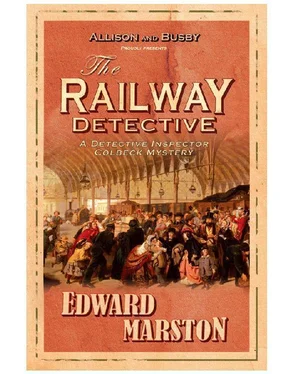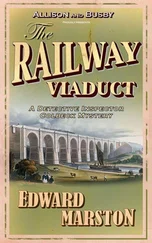Edward Marston - The Railway Detective
Здесь есть возможность читать онлайн «Edward Marston - The Railway Detective» весь текст электронной книги совершенно бесплатно (целиком полную версию без сокращений). В некоторых случаях можно слушать аудио, скачать через торрент в формате fb2 и присутствует краткое содержание. Жанр: Классический детектив, Исторический детектив, на английском языке. Описание произведения, (предисловие) а так же отзывы посетителей доступны на портале библиотеки ЛибКат.
- Название:The Railway Detective
- Автор:
- Жанр:
- Год:неизвестен
- ISBN:нет данных
- Рейтинг книги:4 / 5. Голосов: 1
-
Избранное:Добавить в избранное
- Отзывы:
-
Ваша оценка:
- 80
- 1
- 2
- 3
- 4
- 5
The Railway Detective: краткое содержание, описание и аннотация
Предлагаем к чтению аннотацию, описание, краткое содержание или предисловие (зависит от того, что написал сам автор книги «The Railway Detective»). Если вы не нашли необходимую информацию о книге — напишите в комментариях, мы постараемся отыскать её.
The Railway Detective — читать онлайн бесплатно полную книгу (весь текст) целиком
Ниже представлен текст книги, разбитый по страницам. Система сохранения места последней прочитанной страницы, позволяет с удобством читать онлайн бесплатно книгу «The Railway Detective», без необходимости каждый раз заново искать на чём Вы остановились. Поставьте закладку, и сможете в любой момент перейти на страницу, на которой закончили чтение.
Интервал:
Закладка:
‘The four officers involved see it rather differently now.’
‘They cannot change their minds about a thing like that.’
‘According to Mr Mayne,’ said Colbeck, levelly, ‘they can. If, on mature reflection, they feel that their report of the incident was slightly inaccurate, they can amend it when they give their statements in court. Like me, Mr Mayne agreed that Mulryne should get off with a small fine.’
‘A small fine!’ roared Tallis.
‘I will be happy to pay it on his behalf.’
‘Inspector, he attacked four policemen.’
‘I prefer to remember the two villains whom he took on last night, sir. Both were armed but Mulryne squared up to them nevertheless. All that Sergeant Leeming had to do was to snap on the handcuffs.’
‘Mulryne had no right to be there in the first place.’
‘You said that I had a free hand to choose my men.’
‘I assumed they would be from inside the police force.’
‘Nobody else could have done what Mulryne did last night.’
‘That does not exonerate him, Inspector,’ said Tallis, sourly. ‘Or you, for that matter.’
Colbeck met his glare. ‘Mr Mayne felt that it did, sir,’ he pointed out, calmly. ‘Since you feel so strongly about it, perhaps you should take it up with him.’
Tallis was halted in his tracks. Whatever else he did, he could not countermand the orders of his superior. Colbeck not only had the Police Commissioner on his side, he had, by effecting the three arrests at the Crystal Palace, earned the admiration of the whole department. A vital breakthrough had at last been made in the investigation. To harry him after such a triumph would be seen as sheer vindictiveness. Tallis retreated to the safety of his desk and took out a cigar from its case. Inhaling deeply as he ignited it, he watched Colbeck through the smoke.
‘I will remember this, Inspector,’ he said, sternly.
‘It is all a matter of record, Superintendent.’
‘What do you intend to do now?’
‘Question the three men in custody,’ said Colbeck. ‘They may not give us the name that we want but we can still squeeze some information out of them. Arthur Jukes is their leader. I’ll start with him. To be frank, I hoped that you might join me, sir.’
‘Me?’
‘You know how to speak to an army man.’
‘That’s true,’ said Tallis, slightly mollified, ‘though all three of them are a disgrace to their regiment. If they were still in uniform, they’d be court-martialled.’
‘Make that point to them,’ advised Colbeck. ‘If I introduce you as Major Tallis, it will increase your authority. Do you agree, sir?’
Tallis straightened his back. ‘Yes, Inspector. I think that I do.’
‘And we will need the services of an artist.’
‘An artist?’
‘To draw sketches of the three men,’ explained Colbeck. ‘I want to see if Caleb Andrews recognises any of them. Since he is unable to come here to identify the prisoners, we will have to take a likeness of them to him. He might pick out the man who assaulted him.’
‘The fireman can do that — what was his name?’
‘Frank Pike.’
‘Arrange for him to call here.’
‘I will, sir,’ said Colbeck, smoothly, ‘but I think that Mr Andrews is entitled to have a first look at these three men. After all, he was the real victim.’
‘True enough.’
‘He also deserves to know that we have taken such an important step forward in the investigation. When we finish questioning the prisoners, I’ll go across to Camden to apprise him of the situation. I have more than one reason for wishing to see him,’ he added, thinking of Madeleine. ‘Please put an artist to work as soon as you can.’
Thomas Sholto moved swiftly. In the space of a few hours, he had gathered sufficient information about Robert Colbeck to take back to the house in Upper Brook Street. Sir Humphrey Gilzean was waiting for him. When his manservant showed the visitor into the drawing room, Gilzean got to his feet with urgency.
‘Well?’ he said.
‘I arrived just in time, Humphrey.’
‘In what way?’
‘When I got to Scotland Yard, there was a crowd of reporters waiting to hear details of the arrests. I mingled with them.’
‘Did you get inside?’
‘Yes,’ said Sholto, ‘I pretended that I worked for a provincial newspaper. Nobody paid any attention to me, tucked away at the back.’
‘Who gave the statement? Inspector Colbeck?’
‘No, it was Superintendent Tallis. A military man, by the look of him. He introduced us to the Inspector but would not let him answer any questions. Tallis has taken some severe criticism in the press,’ explained Sholto. ‘He wanted to make sure that he was seen in a better light this time. That’s why he stole all the attention.’
‘So what exactly did take place at the Crystal Palace last night?’
‘Three men lay in wait near the locomotives. When Jukes and the others gained entry, they were promptly arrested.’
‘Three against three? Why did they not fight their way out?’
‘They tried, Humphrey, but they were soon overpowered.’
‘Inspector Colbeck is a brave man,’ said Gilzean, ‘but he took a foolish risk when he fought on equal terms. He is obviously no soldier or he would have had a dozen policemen at his back.’
‘Nevertheless, he got the better of Jukes and the Seymours.’
‘How on earth did he come to be there in the first place? Was it a complete coincidence or a case of inspired guesswork?’
‘Neither,’ replied Sholto. ‘According to the Superintendent, they realised that the shipment of glass for the Great Exhibition was the intended target of the Kilsby Tunnel explosion. That led them on — at least, it led Inspector Colbeck on — to the conviction that the locomotives on display at the Crystal Palace were in potential danger. Last night was the third during which he kept vigil.’
‘A patient man, clearly.’
‘And a powerful one. It seems that he tackled Arthur Jukes on his own and beat him into submission — even though he had to take a few blows himself.’
‘Jukes is a tough character. He would have fought like a tiger.’
‘The tiger has now been caged.’
Gilzean nodded soulfully. It had given him pleasure to organise the train robbery, to inflict damage on a railway company and to outwit the detectives who were put in charge of the case. The murders of William Ings and Daniel Slender had been necessities rather than sources of enjoyment, though they had also been carried out in order to muddy the waters of the investigation. Someone, it now transpired, was able to see clearly through muddy waters and it was troubling.
‘What manner of man is this Robert Colbeck?’ he asked.
‘A positive dandy.’
‘Yet able to acquit himself well in a fight.’
‘I’d not like to take him on, Humphrey.’
Sholto went on to give of description of Colbeck’s appearance and behaviour. Since the Inspector was clearly known to the other reporters, Sholto had taken the trouble to talk to as many of them as possible, picking up all kinds of anecdotes about Colbeck. He retailed them to Gilzean, who assimilated all the facts he had been given.
‘Tall, handsome, single,’ he noted. ‘He must be a ladies’ man.’
‘Apparently not.’
Gilzean was curious. ‘Are you telling me that he seeks exclusively male company?’
‘No,’ said Sholto. ‘I would never accuse him of that.’
‘Then he must have a social life of some kind.’
‘One of the reporters told me that Colbeck is something of a mystery. He trained as a lawyer, went to the bar, then, for some inexplicable reason, chose to become a policeman.’
‘There’s no such thing as an inexplicable reason, Thomas. A man would only make such a radical change of direction if he were prompted by just cause. It would help us if we knew what it was.’
Читать дальшеИнтервал:
Закладка:
Похожие книги на «The Railway Detective»
Представляем Вашему вниманию похожие книги на «The Railway Detective» списком для выбора. Мы отобрали схожую по названию и смыслу литературу в надежде предоставить читателям больше вариантов отыскать новые, интересные, ещё непрочитанные произведения.
Обсуждение, отзывы о книге «The Railway Detective» и просто собственные мнения читателей. Оставьте ваши комментарии, напишите, что Вы думаете о произведении, его смысле или главных героях. Укажите что конкретно понравилось, а что нет, и почему Вы так считаете.












